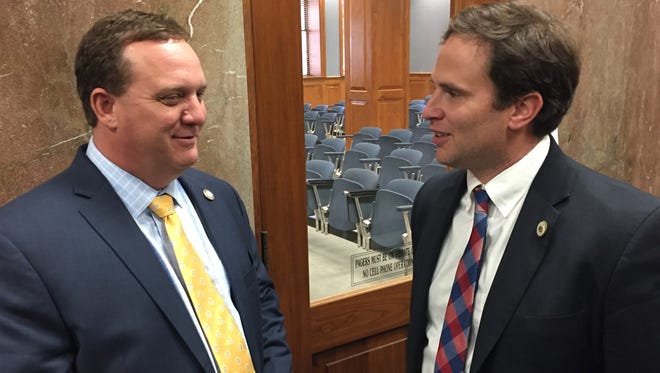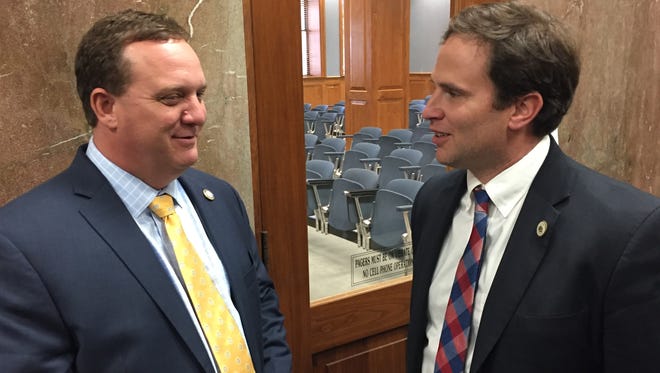First of several marijuana bills gets welcome reception in Louisiana House committee
4 min read

The first of several bills to change Louisiana’s marijuana laws was warmly received by lawmakers Thursday. A bill to tax the raw smokable form of medical marijuana that’s easily passed through a State House committee.
House Bill 514 of Speaker Pro Tem Tanner Magee would impose state sales taxes on the marijuana “flower” as part of the state medical marijuana program. The legislation is tied to another proposal from Magee – a Houma Republican who takes command in the State House – to legalize the sale of the smokable form of marijuana by medical manufacturers and pharmacies.
Several members of the House Ways and Means Committee, which deals with tax issues, personally reported on medical marijuana that was used to help people who died of cancer or other illnesses.
“I had dear friends of mine who I grew up with and I have great respect for them and they got cancer,” said Rep. Phillip DeVillier, a Conservative Republican from Eunice. “The only thing that gave them comfort was that. The only one.”
The panel unanimously approved legislation to apply the state sales tax of 4.45% to the product. Currently, medical marijuana products are not subject to sales tax, and Magee’s proposal would only tax the raw smokable form of the plant, not the tinctures and gums already on the market.
More:Opinions about marijuana are mild in Louisiana; looser laws on the horizon?
The easy passage of the law through the committee is a promising sign for marijuana advocates looking to relax the state’s laws. Patients in Louisiana have had access to medical marijuana since 2019 after years of false starts and delays. However, the program’s strict rules limit manufacturers to making only certain non-smokable forms such as tinctures, topical creams, gums, and metered dose inhalers.
Lawmakers complained that many of these products are too expensive for their constituents who want access to medical marijuana. The head of one of the two state-owned producers – John Davis of the Wellcana Group – previously said that converting the raw flower to oil drives up costs because it requires expensive equipment. Selling the plant’s “flower” – its most popular form – would be cheaper because it doesn’t require as much processing.
Magee argued that if lawmakers don’t relax the rules for selling the “flower”, Louisiana’s medical marijuana program will ultimately die. This is in part because Arkansas and Mississippi have approved the raw form of the plant for sale to patients in their medicinal programs.
“It’s cheaper, it’s more affordable … it’s what consumers want. It’s a simple process,” Magee said. “We can be ahead of Mississippi because their product isn’t on the market yet, and we can be ahead of Arkansas.”
David Brown, a longtime medical marijuana attorney who co-owns one of the state’s nine medical marijuana dispensaries, said he supports efforts to legalize the raw form of marijuana in the medical program. However, he raised concerns about the taxation of the products.
“We are not competitive with other states. There is a real risk that we will lose our competitive position against states like Arkansas and Mississippi,” Brown said. “Four and a half (percent tax) is a lot.”
Since the passage of laws in 2015 and 2016 to kickstart the state’s medical marijuana program, lawmakers have taken small steps to relax the strict rules. Initially, only patients with a list of serious medical conditions such as cancer could access the drug. After a bill was passed last year, doctors can now recommend it to patients for any reason they deem appropriate. Also, metered dose inhalers, which are essentially vaporizers, have been added to the acceptable forms that marijuana can be sold in.
Still, Magee’s bills would mark the most significant expansion of medical marijuana since it went into effect.
Efforts to get patients to buy and tax the smokable form of marijuana have a long way to go before they become law. Magee’s tax bill must be approved by the entire House prior to going through the Senate and, if passed, obtain approval from Democratic Governor John Bel Edwards. Likewise, its companion law to legalize raw marijuana must go through the process.
Legislative analysts estimate that raw marijuana sales would be around $ 38 million initially, which equates to $ 276 million in sales over time. This would mean an initial sales tax of $ 1.7 million and increasing to $ 12 million by 2026.
Magee’s bill would send the proceeds of the taxes to finance transportation projects.
Rep. Beau Beaullieu, R-New Iberia, asked Magee, “We’re going to sell medical marijuana to fill the potholes in Louisiana, right?”
“That’s right, it’s the green highway,” replied Magee.





 Protected by Patchstack
Protected by Patchstack